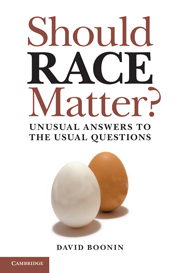Book contents
- Frontmatter
- Contents
- Preface
- 1 Thinking in Black and White
- 2 Repairing the Slave Reparations Debate
- 3 Advancing the Slave Reparations Debate
- 4 One Cheer for Affirmative Action
- 5 Two Cheers for Affirmative Action
- 6 Why I Used to Hate Hate Speech Restrictions
- 7 Why I Still Hate Hate Speech Restrictions
- 8 How to Stop Worrying and Learn to Love Hate Crime Laws
- 9 How to Keep on Loving Hate Crime Laws
- 10 Is Racial Profiling Irrational?
- 11 Is Racial Profiling Immoral?
- Notes
- Sources
- Index
2 - Repairing the Slave Reparations Debate
How I Got into an Argument with Myself about David Horowitz and Lost
Published online by Cambridge University Press: 05 June 2012
- Frontmatter
- Contents
- Preface
- 1 Thinking in Black and White
- 2 Repairing the Slave Reparations Debate
- 3 Advancing the Slave Reparations Debate
- 4 One Cheer for Affirmative Action
- 5 Two Cheers for Affirmative Action
- 6 Why I Used to Hate Hate Speech Restrictions
- 7 Why I Still Hate Hate Speech Restrictions
- 8 How to Stop Worrying and Learn to Love Hate Crime Laws
- 9 How to Keep on Loving Hate Crime Laws
- 10 Is Racial Profiling Irrational?
- 11 Is Racial Profiling Immoral?
- Notes
- Sources
- Index
Summary
Suppose that a white American kidnapped a black American and forced him to work in his home. Virtually everyone would agree that this was wrong of him and that the white American would owe the black American some kind of compensation as a result. If the original perpetrators and victims of American slavery were alive today, then, I suspect that there would be little dispute about the claim that the former would owe a debt of some kind to the latter. But slavery in the United States ended well over a hundred years ago, and none of the original participants remain. The contemporary debate over slave reparations, then, is not about whether wrongdoers owe debts to those they unjustly exploit – surely they do – but rather about whether such debts can meaningfully be passed down through the generations. Do white Americans today owe something to their black contemporaries because some white Americans in the past enslaved some of their ancestors?
In the spring of 2001, the writer and political activist David Horowitz entered this debate in memorable fashion by attempting to take out an ad in seventy-one college newspapers across the country. The message of the ad was reflected in its clear and simple title: “Ten Reasons Why Reparations for Slavery Is a Bad Idea – and Racist Too.” Although polls at the time indicated that roughly three out of four Americans agreed with Horowitz’s assessment, the ad set off a series of events that generated national attention. Forty-three of the newspapers that Horowitz solicited refused to run the ad, and many of those that did run it were attacked for doing so. Copies of some papers were stolen and destroyed by protesters. Horowitz was called a racist. And, somewhat suddenly, the issue of slave reparations was moved closer to the center of the American debate about race.
- Type
- Chapter
- Information
- Should Race Matter?Unusual Answers to the Usual Questions, pp. 24 - 76Publisher: Cambridge University PressPrint publication year: 2011



